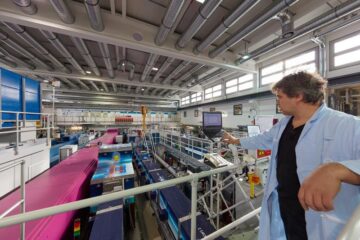www.eduserver.de – Gateway to the German Education System

Anyone who needs reliable information resources and hints on further addresses regarding educational subjects in Germany can find these on the German Education Server. The German Education Server http://www.eduserver.de/zeigen_e.html?seite=480 is an online information system for education that provides sound information and internet resources to the interested public, including resources from the federal and state governments, the European Union, higher education institutions, schools, non-university research and service institutes, state institutes, scientific societies, libraries / documentation centres / museums. Since February 2006 the English language services for international visitors of the internet guide to information resources on education have been systematically improved and updated, see http://www.eduserver.de/start_e.html.
A navigation structure that is fully available in English allows users to gain an insight into the structure of the German education system and its scope. The online information system is introduced by target groups and subject areas. These include early childhood education and care, primary and secondary education, higher education, vocational education and training, continuing education as well as educational research, special needs education and intercultural education.
Furthermore, the online gateway to the German education system offers special interest information resources to its international visitors: the dossier Find out about Germany http://www.eduserver.de/zeigen_e.html?seite=4094 was specifically compiled to meet the needs of visitors from abroad who require basic information on Germany and the German education system. Interesting dossiers and editors' tips http://www.eduserver.de/db/mlesen.html?Id=33645 are offered in the English language. The calendar of events http://www.eduserver.de/termine/termineausgabeliste_e.html points out educational workshops, conferences and lectures in English, and the glossaries on education http://www.bildungsserver.de/glossare.html?sp=1 offer definitions of crucial terms of the German education system and its European dimension in English and French. Additional information and assistance is provided in the Services section, for instance by the option Ask the editor http://www.bildungsserver.de/zeigen_e.html?seite=3503, the RSS Newsfeed and the (German language) newsletter.
The thematic dossier „The internationalisation of the German education system“ http://www.eduserver.de/zeigen_e.html?seite=4316 compiles resources on the development of a European higher education area (Bologna Process), and its counterpart in Vocational Education and Training (Copenhagen Process), and Lifelong Learning.
The German Education Server is a joint venture by the federal government (Bund) and the Länder states. Its office is located at the German Institute for International Educational Research http://www.dipf.de/index_e.htm in Frankfurt / Main, Germany.
Information and Contact
Deutsches Institut für Internationale Pädagogische Forschung (DIPF) / German Institute for International Educational Research, 60486 Frankfurt/M., Schloßstraße 29, Germany, www.dipf.de
Gwendolyn Schulte, International Visitors Services, German Education Server ,
E-Mail schulte@dipf.de, Tel. +49 (0) 69 . 24708-342, http://www.eduserver.de/start_e.html
Public Relations IZ Bildung: Christine Schumann, E-Mail schumann@dipf.de,
Tel. +49 (0) 69.24708-314, www.dipf.de/bildungsinformation.htm
The DIPF institute is one of 84 non-university research institutes belonging to the Leibniz-Gemeinschaft. The scope of the Leibniz institutions is broad, it reaches from natural sciences to engineering, environment and economical and social sciences to space and philosophical sciences, including museums with their own research departments. The institutes are demand-oriented and interdisciplinary. They are of national importance, hence their projects are of federal interest and they are jointly financed by the federal and state governments. For more information, see http://www.wgl.de/extern/englisch/index.html
Media Contact
Alle Nachrichten aus der Kategorie: Bildung Wissenschaft
Neueste Beiträge

Bakterien für klimaneutrale Chemikalien der Zukunft
Forschende an der ETH Zürich haben Bakterien im Labor so herangezüchtet, dass sie Methanol effizient verwerten können. Jetzt lässt sich der Stoffwechsel dieser Bakterien anzapfen, um wertvolle Produkte herzustellen, die…

Batterien: Heute die Materialien von morgen modellieren
Welche Faktoren bestimmen, wie schnell sich eine Batterie laden lässt? Dieser und weiteren Fragen gehen Forschende am Karlsruher Institut für Technologie (KIT) mit computergestützten Simulationen nach. Mikrostrukturmodelle tragen dazu bei,…

Porosität von Sedimentgestein mit Neutronen untersucht
Forschung am FRM II zu geologischen Lagerstätten. Dauerhafte unterirdische Lagerung von CO2 Poren so klein wie Bakterien Porenmessung mit Neutronen auf den Nanometer genau Ob Sedimentgesteine fossile Kohlenwasserstoffe speichern können…





















